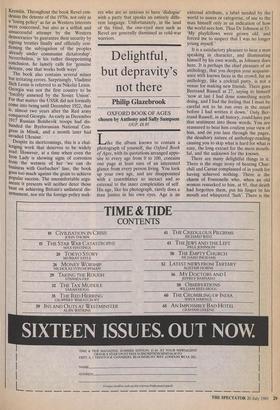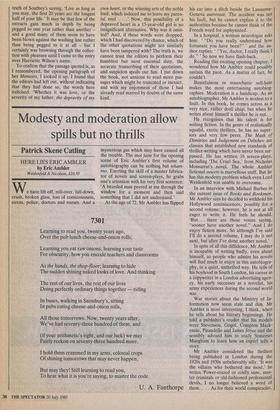Delightful, but depravity's not there
Philip Glazebrook
OXFORD BOOK OF AGES chosen by Anthony and Sally Sampson OUP, £8.95 Like the album known to contain a photograph of yourself, the Oxford Book of Ages, with its quotations arranged appo- site to every age from 0 to 100, contains one page at least sure of an interested glance from every person living. You look up your own age, and are disappointed with a resemblance so inexact and so external to the inner complexities of self. His age, like his photograph, rarely does a man justice in his own eyes. Age is an
external attribute, a label needed by the world to assess or categorise, of use to the man himself only as an indication of how the world sees him. Thus Dr Johnson at 53: `My playfellows were grown old, and forced me to suspect that I was no longer young myself.'
It is a satisfactory pleasure to hear a man speaking in character, and illuminating himself by his own words, as Johnson does here. It is perhaps the chief pleasure of an anthology, that you deepen your acquaint- ance with known faces in the crowd; for an anthology, like a cocktail party, is not a venue for making new friends. There goes Bertrand Russell at 27, saying to himself `now at last I had done something worth doing, and I had the feeling that I must be careful not to be run over in the street before I had written it down.' Only Ber- trand Russell, in all history, could have put that sentiment into those words. You are reassured to hear him confirm your view of him, and on you laze through the pages, the desultory nature of anthology-reading causing you to skip what is hard for what is easy, the long extract for the mere mouth- ful, and the unknown for the known.
There are many delightful things in it. There is the stage irony of hearing Chur- chill and Caesar complained of in youth for having achieved nothing. There is the charm of Fontenelle who, when an old woman remarked to him, at 95, that death had forgotten them, put his finger to his mouth and whispered `Sssh'. There is the truth of Southey's saying, 'Live as long as you may, the first 20 years are the longest half of your life.' It may be that few of the extracts gain much in depth by being pegged to one year rather than another and a good many of them seem to have been blown against the washing line rather than being pegged to it at all — but I certainly was browsing through the collec- tion with pleasure until I came to the entry over Harriette Wilson's name.
To confirm that the passage quoted is, as I remembered, the opening paragraph of her Memoirs, I looked it up. I found that the editors had left out, without indicating that they had done so, the words here italicised: 'Whether it was love, or the severity of my father, the depravity of my own heart, or the winning arts of the noble lord, which induced me to leave my paren- tal roof . . .' Now, this possibility of a depraved heart in a 15-year-old girl is no insignificant alternative. Why was it omit- ted? And, if these words were dropped, which I had discovered by chance, which of the other quotations might not similarly have been tampered with? The truth is, we cannot trust the editors to perform their humblest but most essential duty, the accurate transcribing of their quotations, and suspicion spoils our fun. I put down the book, not anxious to read more pas- sages which might be truncated or inexact, and with my enjoyment of those I had already read marred by doubts of the same kind.



















































 Previous page
Previous page